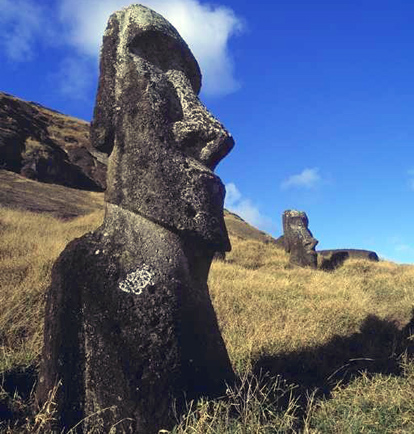 Since retiring, we’ve done a lot of travelling, and we’ve also adapted our t.v. watching to those discovery channel history channel programs that explore archeology, or some previous society. I remember one about Easter Island. It was focused on the disappearance of the island’s people. As I recall it, they had a fairly solid case that the islanders had used up all the trees in the process of making their statues on their little island. Then came erosion, no crops, food shortage, wars and maybe cannibalism, until they were near extinction. A lot of the stories of primitive civilizations end up with a similar story line. Some group builds a civilization, but something about the way they do things destroys their resources and away they go – quickly or slowly. That’s not the only way societies rise and fall as we know. Besides outgrowing resources, there’s outgrowing the power structure, or outgrowing religion, or wars, or disease. Human beings are pretty adept at not forming societies that survive.
Since retiring, we’ve done a lot of travelling, and we’ve also adapted our t.v. watching to those discovery channel history channel programs that explore archeology, or some previous society. I remember one about Easter Island. It was focused on the disappearance of the island’s people. As I recall it, they had a fairly solid case that the islanders had used up all the trees in the process of making their statues on their little island. Then came erosion, no crops, food shortage, wars and maybe cannibalism, until they were near extinction. A lot of the stories of primitive civilizations end up with a similar story line. Some group builds a civilization, but something about the way they do things destroys their resources and away they go – quickly or slowly. That’s not the only way societies rise and fall as we know. Besides outgrowing resources, there’s outgrowing the power structure, or outgrowing religion, or wars, or disease. Human beings are pretty adept at not forming societies that survive.
In these historic epics, there are all kinds of things to think about – human group psychology, ecology and resources, aggression and power motives, and things like nature [Pompeii]. But it strikes me that with little exception, one can explain most of them with one simple formula – growing. We humans master the environment so our population can grow, but then we find some creative new way to outgrow it. So then we run out of resources, or we go off looking for a new place with plenty of room, conquering to get it if necessary. In my part of the world, the Cherokee came south in the 1600s and claimed land that had been occupied lightly by other tribes. But they never got their chance to play out their own scenario, because not too much later, the white settlers came overflowing from Europe and drove them west. I once heard a quote [that I can’t find anymore] that described the Coast of California as the "last cliffs" of mankind’s march westward. That’s where we reached the end of the line. So our stories of the western frontier have been replaced by traveling into space.
There is coming an inevitable time when we can’t ignore this historical truth – we can’t just grow – grow our businesses, grow our economy, grow our energy resources, or our housing markets, or the national debt. No matter what parameter we choose to look at, there’s always an end of the line out there somewhere. One would think that’s so obvious that we’d be collectively planning for it, but we aren’t. And it doesn’t sound like population control is part of our near-term history. It’s tempting to go the route of wistfully decrying man’s folly. And so we kept building until we’d ringed the island with our statues staring out to sea, but there was no place for us anymore. The food was gone…

Sorry, the comment form is closed at this time.